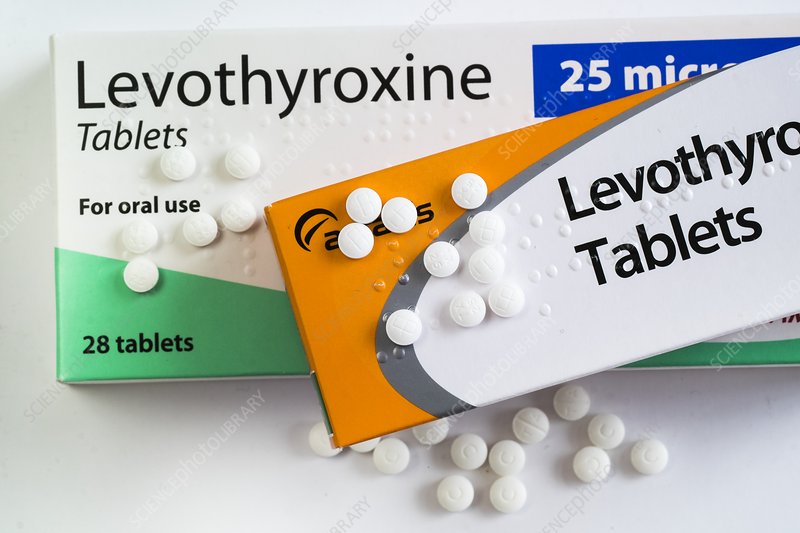Among the known side effects of levothyroxine is insomnia – a sleep disorder in which the person affected has trouble falling and/or staying asleep.
The use of levothyroxine can induce sleeplessness and cause you to lie awake at night with your eyes very wide open, waiting for sleep to come. This happens when there is too much thyroxine hormone production, induced by the continuous use of levothyroxine, which causes overactive thyroid or a condition known as hyperthyroidism.
Overactive thyroid can lead to anxiety, rapid heart rate and sleeplessness (insomnia).
Naturally, the thyroid gland, located at the base of your neck just below your Adam’s apple, produces the hormone thyroxine which many organs and systems of your body rely on to function properly. When your thyroid gland produces too little or too much thyroid hormone, it throws your body’s metabolism off balance, which can affect your sleep.
Too little thyroid hormone production causes an underactive thyroid, or hypothyroidism. This may result in fatigue, lack of energy and excessive daytime sleepiness.
Recommended: What Happens If You Use Ozempic After 56 Days?
Everyone experiences sleepiness during the day or a night of bad sleep on different occasions. When sleep disturbances become the norm, however, it may be time to investigate a medical cause such as thyroid disease.
One of the ways to stimulate thyroid hormone production is the use of levothyroxine.
What is Levothyroxine?
Levothyroxine, which is also referred to as L-thyroxine, is a manufactured form of the thyroid hormone thyroxine (T4). It is a prescription drug which comes as a tablet or capsule that can be taken by mouth or as an intravenous injectable solution that can be given to patients by a trained healthcare provider.
Levothyroxine is available as both brand-name and generic products.
Common brand names for levothyroxine include Eltroxin, Euthyrox, Eutirox, Letrox, Levaxin, Lévothyrox, Levoxyl, L-thyroxine, Thyrax, and Thyrax Duotab in Europe; Thyrox and Thyronorm in South Asia; Unithroid, Eutirox, Synthroid, and Tirosint in North and South America; and Thyrin and Thyrolar in Bangladesh.
Recommended: How Long Does Ketamine Pain Relief Last?
Numerous generic versions also are available. It is recommended and advisable not to switch between the brand-name and the generic levothyroxine formulations or change back and forth from one to another.
Levothyroxine oral tablet may be used as part of a combination therapy. This means you may need to take it with other medications.
What is Levothyroxine used for?
Levothyroxine is used to treat thyroid hormone deficiency, known as hypothyroidism; a condition when the thyroid gland produces too little thyroid hormone.
It can also be used to treat Hashimoto’s thyroiditis, also known as Hashimoto’s disease or chronic lymphocytic thyroiditis; which is an autoimmune disease in which the thyroid gland is destroyed.
This drug can also be used to treat an extreme or severe form of hypothyroidism known as myxedema coma.
Levothyroxine also can be used to treat goiter, which is an enlarged thyroid gland. It can also be used to treat and prevent certain types of thyroid tumors.
Levothyroxine Prescriptions
The prescription of levothyroxine and every other drug can only be done by a physician. Contact your doctor for a proper guidance on how to use any drug.
Other side effects of levothyroxine
Get emergency medical help if you have signs of an allergic reaction to levothyroxine: hives; difficult breathing; swelling of your face, lips, tongue, or throat.
Call your doctor at once if you have:
- fast or irregular heartbeats;
- shortness of breath;
- vomiting;
- increased appetite;
- weight loss;
- fever, hot flashes, sweating;
- tremors, or if you feel unusually cold;
- memory problems, feeling depressed;
- irregular menstrual periods;
- chest pain, pain spreading to your jaw or shoulder;
- changes in your menstrual periods;
- diarrhea;
- headache, leg cramps, muscle aches;
- feeling nervous or irritable;
- dryness of your skin or hair, hair loss; or
- skin rash, partial hair loss.
This is not a complete list of side effects and others may occur. Call your doctor for medical advice about side effects.
NB: levothyroxine cannot be used to treat obesity or weight problems. Dangerous side effects or death can occur from the misuse of levothyroxine, especially if you are taking any other weight-loss medications or appetite suppressants.
Disclaimer: The information contained in this article is provided as an information resource only. This information should not be used as a substitute for professional diagnosis and treatment. You should always consult your doctor or other healthcare professional before taking any medication. The drug information contained herein is subject to change and is not intended to cover all possible uses, directions, precautions, warnings, drug interactions, allergic reactions, or adverse effects. The absence of warnings or other information for a given drug does not indicate that the drug or drug combination is safe, effective, or appropriate for all patients or all specific uses.

Cool article
[…] Recommended: Can too much levothyroxine cause insomnia? […]
[…] Recommended: Can too much levothyroxine cause insomnia? […]